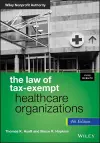
The Law of Tax-Exempt Healthcare Organizations, + Website
2 authors - Hardback
£230.00
Thomas K. Hyatt is a partner in the law firm Dentons US LLP, resident in the Washington, DC office. His practice is focused on corporate and tax-exempt organization issues for nonprofit organizations. He has particular expertise in legal issues affecting tax-exempt healthcare providers and in governance and public policy issues affecting tax-exempt higher education institutions.
Mr. Hyatt has represented organizations including public and private hospitals, multihospital systems, integrated delivery systems, academic medical centers, home health agencies, health maintenance organizations, continuing care retirement communities, provider associations, physician clinics, faculty practice plans, physician-hospital organizations, and shared services organizations in such matters. He also frequently works with nonprofit governing boards and board committees to address such issues as regulatory compliance, fiduciary duty, conflicts of interest, bylaws development and revision, senior management compensation and benefits, chief executive contracts and ransition, fundraising, lobbying and political campaign activity, board development, policy development, adoption of best governance practices, membership matters, corporate restructuring, mergers, and joint ventures. He is admitted to practice in the District of Columbia and Pennsylvania.
Bruce R. Hopkins is the principal in the law firm Bruce R. Hopkins Law Firm, LLC, in Kansas City, Missouri. He concentrates on the representation of tax-exempt organizations, including healthcare organizations. His practice ranges over the entirety of law matters involving exempt organizations, with emphasis on the formation of nonprofit organizations, acquisition of recognition of tax-exempt status for them, governance and the law, the private inurement and private benefit doctrines, the intermediate sanctions rules, legislative and political campaign activities issues, public charity and private foundation rules, unrelated business planning, use of exempt and for-profit subsidiaries, joint venture planning, tax shelter involvement, review of annual information returns, Internet communications developments, the law of charitable giving (including planned giving), and fundraising law issues.